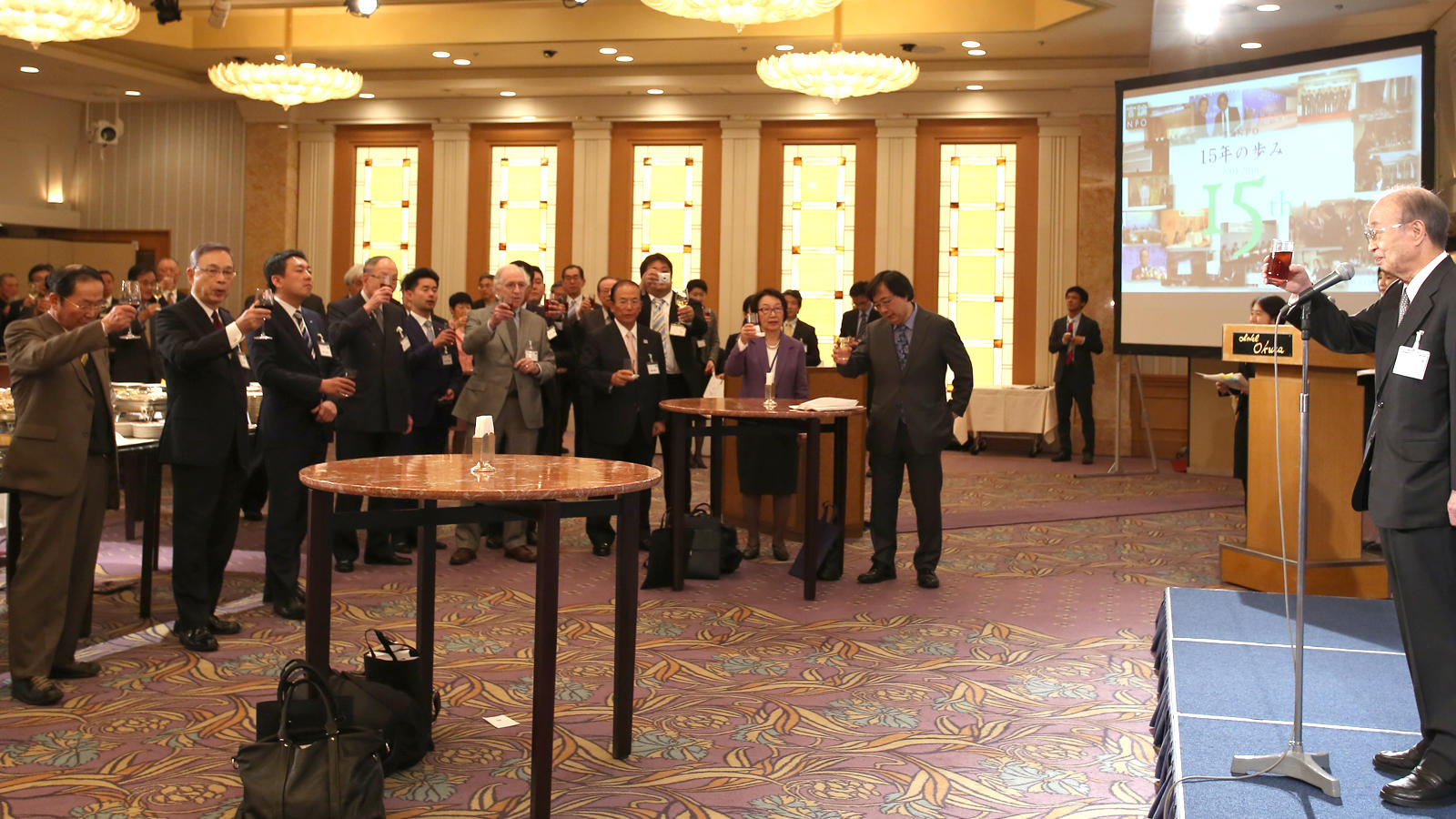
The Genron NPO held a reception at Hotel Okura Tokyo on Nov. 21 to mark the 15th anniversary of its founding, drawing some 200 dignitaries and supporters from all quarters.
The commemorative reception began with an opening address by Yoriko Kawaguchi, a former Japanese foreign minister and currently a professor at the Meiji Institute for Global Affairs, Meiji University.

 In his congratulatory remarks, former Prime Minister Yasuo Fukuda said
In his congratulatory remarks, former Prime Minister Yasuo Fukuda said
that the Tokyo-Beijing Forum, an annual workshop of opinion leaders from Japan and China, was launched by The Genron NPO 12 years ago at a time when Japan-China relations were at a dangerously low ebb.
The fact that this forum has been held every year since then shows the ongoing critical state of bilateral relations, adding that the significance of The Genron NPO will continue for many years to come, he said. Fukuda serves as supreme advisor to the Tokyo-Beijing Forum.
Fukuda also said that mutual understanding between the people of both countries is indispensable if the long-protracted rift in relations between Japan and China is to be healed, calling for increased efforts to overcome the difficulties in bilateral relations through the continuation of the forum as a dialogue channel.
 Yasushi Akashi, a former U.N. undersecretary-general and chairman of the International House of Japan, told the gathering that he felt democracy all over the world was in crisis. "In order to block the spread of populism, serious and active debate should be conducted not only in Japan but on an international scale," he said.
Yasushi Akashi, a former U.N. undersecretary-general and chairman of the International House of Japan, told the gathering that he felt democracy all over the world was in crisis. "In order to block the spread of populism, serious and active debate should be conducted not only in Japan but on an international scale," he said.
Chinese Ambassador to Japan Cheng Yonghua, in a message delivered to the reception, expressed his appreciation for The Genron NPO's joint sponsorship of the Tokyo-Beijing Forum with its Chinese partner for the past 12 years.
He noted that both countries will observe the 45th anniversary next year of the normalization of diplomatic relations and the 40th anniversary in 2018 of the conclusion of the Japan-China peace and amity treaty.
By making the most of those opportunities, Japan-China relations should be shifted to a rational and forward-looking direction in order to foster positive energy toward the stabilization and progress of bilateral ties, the Chinese ambassador said.
Among the guests who delivered brief addresses were Gerald Curtis, a professor emeritus at Columbia University, former Indonesian Foreign Minister Hassan Wirajuda and Takeaki Matsumoto, a former foreign minister and Democratic Party of Japan member of the Lower House. The three served as panelists at a commemorative forum held earlier in the day.
Other speakers were Shigeru Ishiba, formerly the Cabinet minister in charge of bolstering local economies, and some members of The Genron NPO's advisory board, including Mitsuo Ohashi, Toshiro Muto, chairman of Daiwa Institute of Research and a former deputy governor of the Bank of Japan, and Yuji Miyamoto, a former Japanese ambassador to China and chairman of the Miyamoto Institute of Asian Research, Japan.
 Toward the close of the reception, Genron NPO President Yasushi Kudo told the guests that he is using the occasion of the 15th anniversary of his institute's founding to renew his determination to create a solid venue for the development of Japanese democracy and to pass it on to the next generations.
Toward the close of the reception, Genron NPO President Yasushi Kudo told the guests that he is using the occasion of the 15th anniversary of his institute's founding to renew his determination to create a solid venue for the development of Japanese democracy and to pass it on to the next generations.
"Democracy is not a perfect system and it is quite vulnerable. Therefore, we, individual citizens, must assume the task of solving problems as stakeholders without relying on others," he said.
As tasks The Genron NPO is set to address in the coming years, Kudo cited 1) the presentation of concrete plans for the reform of systems and institutions that constitute democracy by closely re-examining Japanese democracy; 2) the launch of a performance evaluation formula for media organizations in order to create an environment for appropriate competition in media circles; and 3) the creation of dialogue platforms through which the voices of citizens and intellectuals can be delivered to government and politicians.
Finally, Kudo revealed his plan to organize a forum in Tokyo in March next year by inviting representatives of leading think tanks in 10 major countries, and to launch debate for the sake of democracy in Asia and in the world at large, adding that the proposals to address regional and global issues resulting from those discussions will be directly forwarded to the leaders of the G-7 and G-20 summits.

Post a comment